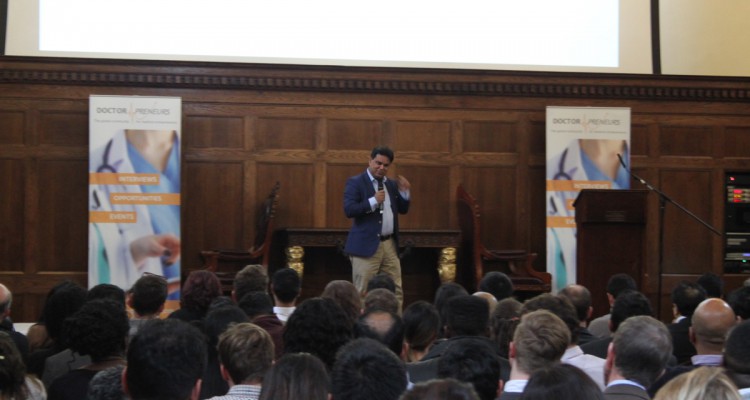Our Doctorpreneurs Startup School in November brought together more than 200 entrepreneurial doctors from all over the United Kingdom.
Traditionally the UK has lagged behind the US in terms of digital disruption and start-up innovations, partly due to the historically more risk-averse British temperament. However, on a backdrop of global political uncertainty, under high ceilings and tall wooden beams, the inaugural Doctorpreneurs Startup School at St Thomas’ Hospital in London sought to redress the balance. It brought together entrepreneurial doctors and medical students in the UK seeking to disrupt the status quo, and set a more ambitious direction for the future of UK healthcare innovation.
One suggestion as to why UK entrepreneurs have been relatively less successful in the start-up scene is that we’re less ambitious than our US counterparts, because we worry more about failing. Successful doctors-turned-entrepreneurs at the Doctorpreneurs event did indeed talk openly about failing. Though perhaps more importantly, they addressed the fear of failing. That intangible feeling that can constrain us, especially those who have limited experience of actual failure, and stop us in our tracks. Coupled with this internal fear is the unwelcome external reality of funding difficulties in the UK, compared to the US, that perpetuates a culture of startup failure.
Hussein Kanji, co-founder of Hoxton Ventures, in a recent BBC report stated: “It would still be hard for something like an Uber to be born out of the UK because I don’t think there’s a financing community that would give Uber the billions of dollars that it has consumed to get to the global stage.” The BBC commented that the funding for startups in the UK is “appallingly bad”, hindering their expansion into global markets.

200+ doctors, medical students and other startup founders attended the Startup School on November 5th, 2016 held at St Thomas’ Hospital
Hard, but not impossible. To be sufficiently ambitious to create a so-called unicorn in the UK these fears of failure and funding difficulties need to be overcome, and the Doctorpreneurs event served to do just that.
“Pivot is another word for failure”, joked Ragen Nagar, founder of MedicaliQ, “Don’t be afraid of failure.”
It seems the ability to conquer the fear of failing lies in a form of “cognitive reframing”, a psychological technique that enables a supposedly unfavourable situation to be viewed from a new perspective. It was noticeable how the speakers, when divulging the highs and lows of their entrepreneurial journey, did not ever “fail”. Instead, they “pivoted” – they changed direction and tried something new or slightly different. Success followed. Dr. Felix Jackson of medDigital “pivoted” four times before his UK company started growing exponentially. “Pivot early or re-articulate”, advised Dr. Guy Gross during an afternoon workshop.
At this event, failure was reframed to be positive, to be embraced, and integral to the overall entrepreneurial journey. Quite frankly, it was hard to ignore the infectious go-for-it attitude of the doctors-turned-entrepreneurs: “Live a full life and do the best you can. Let’s do that and not worry about failure,” encouraged Dr. Owain Rhys Hughes, founder of UK integrated healthcare platform Cinapsis.
Embracing failure aside, a few other keys to success were highlighted to help inspire the attending doctors and medical students to think big and grow successful healthcare startups in the UK.
Do Not Undervalue Passion
Each doctorpreneur told of a unique experience but passion was the common thread that weaved together the success stories. The message was simple. Choose something you are passionate about, because it will be this passion that will fuel the fire when embers are burning low and you are about to pack it in. The same passion will ignite confidence from within to stand up for an idea in front of investors. Most crucially, passion cannot be replicated by anyone else, even if they have a similar idea. It is an inherent USP.
‘This [passion] is something you will need bucket loads of’ proclaimed Na’eem Ahmed, Founder of Selfless.
Passion does come with a price though, and you should not let investors undervalue this. “Believe in yourself and don’t give out freely what you are going to be working very hard at for the next five years,” cautioned Dr Stephanie Eltz, co-founder of Doctify, a leading UK appointment-booking platform.
Recruit a Talented Team
“Hiring the best people is like saying ‘do a good job’,’” teased Julian Hamann, co-founder of Cupris. He has a point. Patronising as it may sound, the importance of a good team cannot be underestimated. “With a good team, you can adapt the idea to be successful,” highlighted Rajen Nagar, founder of DentaliQ.
Recommendations on how to find your dream team included networking at events such as this Startup School, mining LinkedIn, and using Escape the City – the UK’s go-to website for those transitioning from a corporate to start-up career.
‘’Your network will be your biggest asset. Keep in touch. You don’t know where in journey they may help you’ – Dr Kartik Modha, founder of myHealthSpecialist.
Get Good at Story Telling
“At any level, you are more likely to win funding if you can tell a story.” This was a lesson taught by physician, physiologist and serial technology entrepreneur, Dr Jack Kriendler, and exemplified during the lunchtime pitching competition, won by Suvera duo Ivan Beckley and Will Gao.

Jack Kriendler advises encompassing a story into your pitch to increase your chance of getting funding for your start-up
“Go back to basics and tell a story, like you are sitting around a campfire. Everyone loves a good story. If you are relatable, engaging, can hold an audience, perhaps even make them laugh or even ‘add a bit of drama’, you will be hard to resist.”
Medical training in the UK is increasingly supporting innovation and entrepreneurship, exemplified by the NHS Innovation Accelerator that started up in 2015 and the introduction of a flagship Future Medicine course led by renowned surgeon Shafi Ahmed at a London medical school next year. Alongside these formal programmes, the Doctorpreneurs community through this Startup School is inspiring UK doctors and medical students to embrace failure and ambitiously scale their healthcare start-ups. The status quo has been disrupted, and Silicon Valley had better watch out, there may be some UK healthcare unicorns on the horizon.
Go back to basics and tell a story, like you are sitting around a campfire. Everyone loves a good story.
A short video of the Start-up School’s 2016 highlights.
Join Doctorpreneurs for free today to be the first to hear about future events. We have also now launched our Doctorpreneurs Startup Guide which will be included in your welcome pack!


